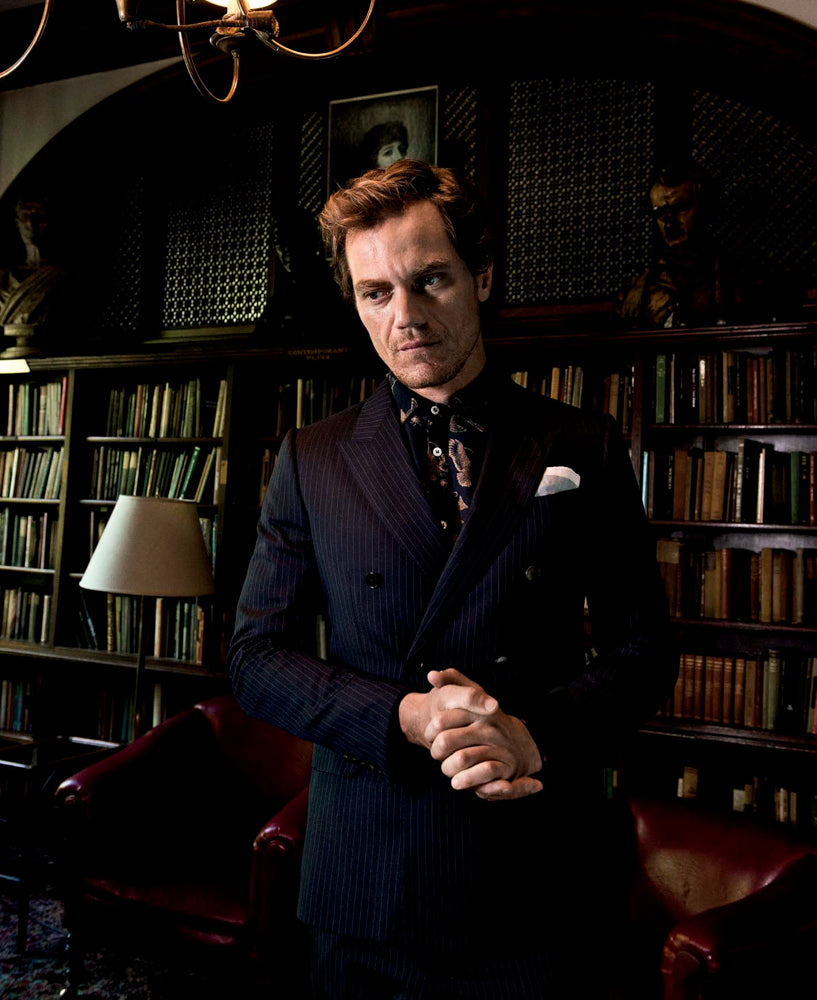
The Dark Horse
THE DARK HORSE

Michael Shannon steps out of the shadows
It was this searching aspect of Elvis’s character that resonated most with Shannon. He wishes people spent more time contemplating their existences and less time staring at their Instagrams.
Michael Shannon is skeptical about new technology. He values his freedom and likes to experience the real world without a filter. He explains this to me shortly after taking his seat at a dive bar in downtown Manhattan and making note of my cell phone and Apple Watch. His mother-in-law just bought a Fitbit to count her footsteps. She wants to take ten thousand a day. “It’s all magnificent!” he says dryly.
Shannon recently watched 2001: A Space Odyssey on an airplane. “And the whole time I was just sitting there flabbergasted,” he says. “Like, don’t people see what’s coming?”
At forty-one, the actor best known for Boardwalk Empire and Revolutionary Road, for which he was nominated for an Oscar, is still able to mix freely among us earthlings without being harassed on the street. When he ambles into Milano’s, no one seems to notice. But that will soon change. In the coming months, his career is set to zoom past General Zod levels (Superman vs. Batman: Dawn of Justice opens in March) — he has at least five movies coming out between the fall and spring.


“This picture is kinda blurry, because I was nervous taking it, but this is Elvis’s bedroom when he was a teenager,” he says, directing my attention to a fuzzy image of a jaundiced wall and tiny bed.
“If it wasn’t blurry, you’d be able to see that the walls are covered with lipstick kisses from women kissing them,” he says. “You can just imagine Elvis standing at the window, looking out at the road, and thinking about his life, and who he was going to be, and what he was going to do.”
In the weeks after taking the photo, while getting into character, he would flip open his phone and return to that room. “I found it very moving and inspiring for me to do my job.”
Elvis, like Shannon, was spiritual-minded. “He was really on a quest to understand why he was who he was and why he existed,” he says, pausing to quaff his pilsner. It was this searching aspect of Elvis’s character that resonated most with Shannon. He wishes people spent more time contemplating their existences and less time staring at their Instagrams.
Director Ramin Bahrani, who cast Shannon as a ruthless real estate broker working the foreclosure game in 99 Homes, which opens September 25, intuited something more than perfectionism or careerism in the actor’s drive.
“Sometimes an actor wants to be great, and you can see them trying to be great. For Michael, it’s something deeper; he doesn’t want to stop until it’s the best performance for the scene,” Bahrani says. “I feel it’s something he’s searching for in his life — he wants to do something that would make it all worth it. I’ve never seen someone so dedicated to the craft.”

“Sometimes an actor wants to be great, and you can see them trying to be great. For Michael, it’s something deeper.”
That focus is refreshingly absent in our conversation, which veers seamlessly from HAL to the surfeit of A-list actors doing voice-overs for ad campaigns.
“I find it really annoying because those people don’t need the money, and there are friends of mine in Chicago who used to get by on voice-over work,” he says. His voice, the same steady midwestern drawl he’s lent to hard men like the notorious contract killer Richard Kuklinski in 2012’s The Iceman and Boardwalk Empire’s tortured lawman Nelson Van Alden, gains momentum when he finds a purpose. “Now they don’t get those jobs anymore because there’s some celebrity doing it!”
And don’t get him started on Star Wars.
“What the hell is George Lucas doing?” he says.
“Just knock it off already. The first three Star Wars were perfect.”
I point out that Lucas is no longer at the helm.
“Oh, that’s right,” he says. A moment of contemplation. “Isn’t it, like — it’s not J.J. Abrams, is it?”
Indeed.
“Oh, shit. I don’t want to piss him off.”
Not that he has much to worry about if he does. There’s a growing consensus among directors that Shannon is one of the finest actors working today. For the last two years his calendar has been booked solid. So much so that this fall, Shannon says, there has been some concern from studio folk that he might have “too much skin in the game.”
“Are people really going to want to see more than one Michael Shannon movie?” he asks rhetorically. “But the movies aren’t really about me, they’re about what they’re about. I just happen to be in them.”
In 99 Homes, he plays Rick Carver, a Gordon Gekko ― vian real estate shark who builds an empire foreclosing on hapless homeowners in South Florida, evicting them, and then flipping the boxes, as they’re known in the industry. To prepare for the part, Shannon spent time with a particular box broker — the film is based in large measure on true events and real characters — and received “an education in the art and science of nefarious real estate dealings.” Right up until the end, Shannon’s portrayal of this all-too-human villain forces viewers to confront their own ideas about greed and morality.
A week later, on October 2, Freeheld will hit theaters, carrying yet another reality-based bit of social commentary, albeit with a much cleaner payload. Freeheld tells the story of police lieutenant Laurel Hester (Julianne Moore), who after being diagnosed with terminal lung cancer battles Ocean County, NJ, to secure pension benefits for her domestic partner, Stacie Andree (Ellen Page). Shannon plays Dane Wells, Hester’s longtime partner at the Ocean County Police Department, who is surprised to learn his partner is gay and then appalled that she’s being denied the dignities afforded any other cop.

There’s a growing consensus among directors that Michael Shannon is one of the finest actors working today.
“To me, this role totally redefines Michael as an actor,” says director Peter Sollett. “People will get a chance to see him play this largehearted, loving, and even paternal character.” (According to Sollett, the actresses took to calling him “Shanny.”)
Shannon would frequently consult the real-life Detective Wells, who was on set for a number of scenes. “They became a binary unit — Michael would ask him about word selection and emphasis,” says Sollett. “His devotion to presenting Dane honestly was inspiring.”
“What you realize when you’re making a ‘social commentary’ movie is that it really just boils down to people’s hearts, you know, people doing what’s in their heart,” says Shannon. “And I guess one of the beautiful things about humanity is that most of the time, what’s in people’s heart is to do the right thing.”
Outside of work and his indie rock trio, Corporal, reality for Michael Shannon revolves around his family in Red Hook, Brooklyn. When he can, he likes to get up with his kids — he has two daughters — and make breakfast, goof around for a while, and then take his older daughter to school. He’s also been jogging a lot lately. He’ll go to Prospect Park and run the loop there. Sometimes, he’ll do it twice. Recently, he did three loops, which he estimates is about ten miles. “Something to be proud of, I guess,” he deadpans, draining his beer.
He’s fit and trim, but not trying to look like Adonis. Growing up in Lexington, Kentucky, he was never much into sports, and for a long time never did any kind of physical activity, so running is definitely a new thing. “Maybe it’s psychological, like I don’t want my body to deteriorate or something,” he says. “Gotta enjoy it all while I can still move around.”




